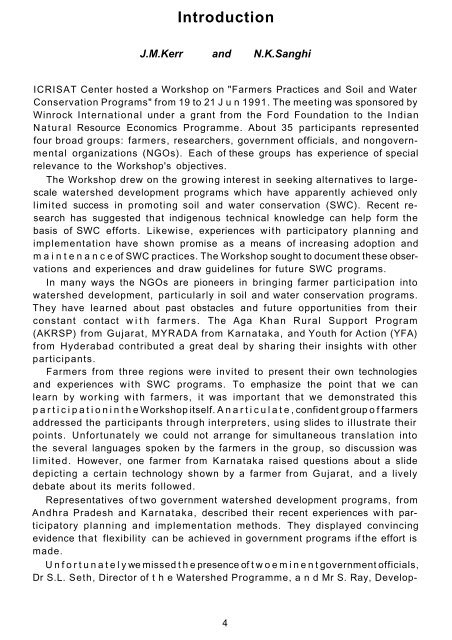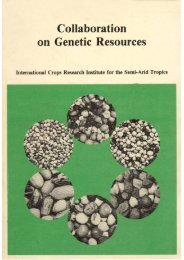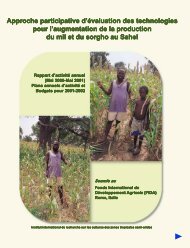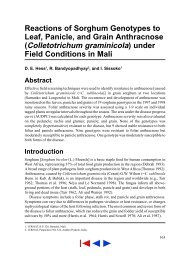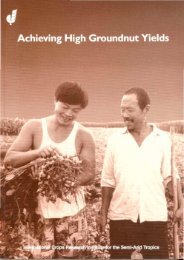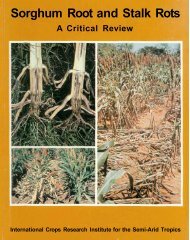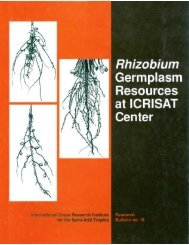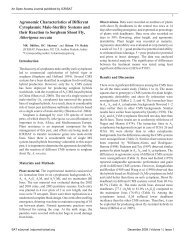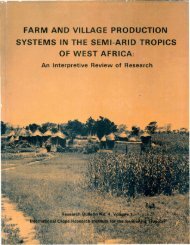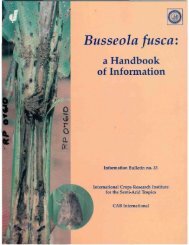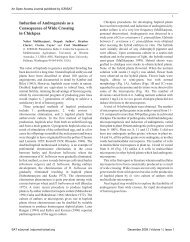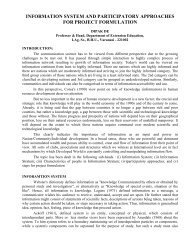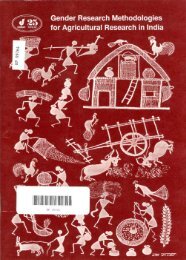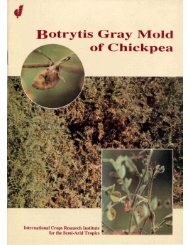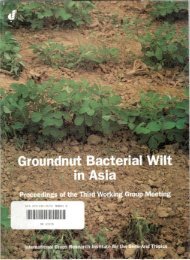Indigenous Practices for Soil and Water Conservation - Agropedia
Indigenous Practices for Soil and Water Conservation - Agropedia
Indigenous Practices for Soil and Water Conservation - Agropedia
Create successful ePaper yourself
Turn your PDF publications into a flip-book with our unique Google optimized e-Paper software.
Introduction<br />
J.M.Kerr <strong>and</strong> N.K.Sanghi<br />
ICRISAT Center hosted a Workshop on "Farmers <strong>Practices</strong> <strong>and</strong> <strong>Soil</strong> <strong>and</strong> <strong>Water</strong><br />
<strong>Conservation</strong> Programs" from 19 to 21 J u n 1991. The meeting was sponsored by<br />
Winrock International under a grant from the Ford Foundation to the Indian<br />
Natural Resource Economics Programme. About 35 participants represented<br />
four broad groups: farmers, researchers, government officials, <strong>and</strong> nongovernmental<br />
organizations (NGOs). Each of these groups has experience of special<br />
relevance to the Workshop's objectives.<br />
The Workshop drew on the growing interest in seeking alternatives to largescale<br />
watershed development programs which have apparently achieved only<br />
limited success in promoting soil <strong>and</strong> water conservation (SWC). Recent research<br />
has suggested that indigenous technical knowledge can help <strong>for</strong>m the<br />
basis of SWC ef<strong>for</strong>ts. Likewise, experiences with participatory planning <strong>and</strong><br />
implementation have shown promise as a means of increasing adoption <strong>and</strong><br />
m a i n t e n a n c e of SWC practices. The Workshop sought to document these observations<br />
<strong>and</strong> experiences <strong>and</strong> draw guidelines <strong>for</strong> future SWC programs.<br />
In many ways the NGOs are pioneers in bringing farmer participation into<br />
watershed development, particularly in soil <strong>and</strong> water conservation programs.<br />
They have learned about past obstacles <strong>and</strong> future opportunities from their<br />
constant contact w i t h farmers. The Aga Khan Rural Support Program<br />
(AKRSP) from Gujarat, MYRADA from Karnataka, <strong>and</strong> Youth <strong>for</strong> Action (YFA)<br />
from Hyderabad contributed a great deal by sharing their insights with other<br />
participants.<br />
Farmers from three regions were invited to present their own technologies<br />
<strong>and</strong> experiences with SWC programs. To emphasize the point that we can<br />
learn by working with farmers, it was important that we demonstrated this<br />
p a r t i c i p a t i o n i n t h e Workshop itself. A n a r t i c u l a t e , confident group o f farmers<br />
addressed the participants through interpreters, using slides to illustrate their<br />
points. Un<strong>for</strong>tunately we could not arrange <strong>for</strong> simultaneous translation into<br />
the several languages spoken by the farmers in the group, so discussion was<br />
limited. However, one farmer from Karnataka raised questions about a slide<br />
depicting a certain technology shown by a farmer from Gujarat, <strong>and</strong> a lively<br />
debate about its merits followed.<br />
Representatives of two government watershed development programs, from<br />
Andhra Pradesh <strong>and</strong> Karnataka, described their recent experiences with participatory<br />
planning <strong>and</strong> implementation methods. They displayed convincing<br />
evidence that flexibility can be achieved in government programs if the ef<strong>for</strong>t is<br />
made.<br />
U n f o r t u n a t e l y we missed t h e presence of t w o e m i n e n t government officials,<br />
Dr S.L. Seth, Director of t h e <strong>Water</strong>shed Programme, a n d Mr S. Ray, Develop-<br />
4


